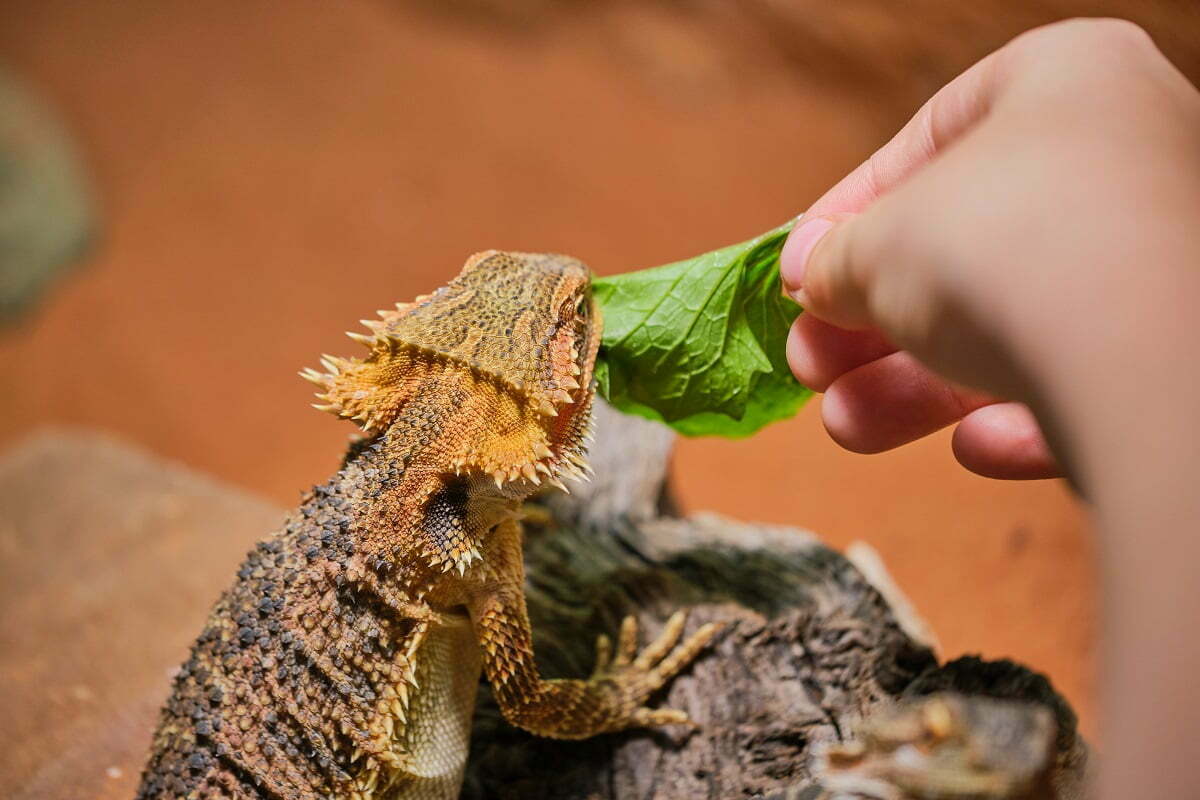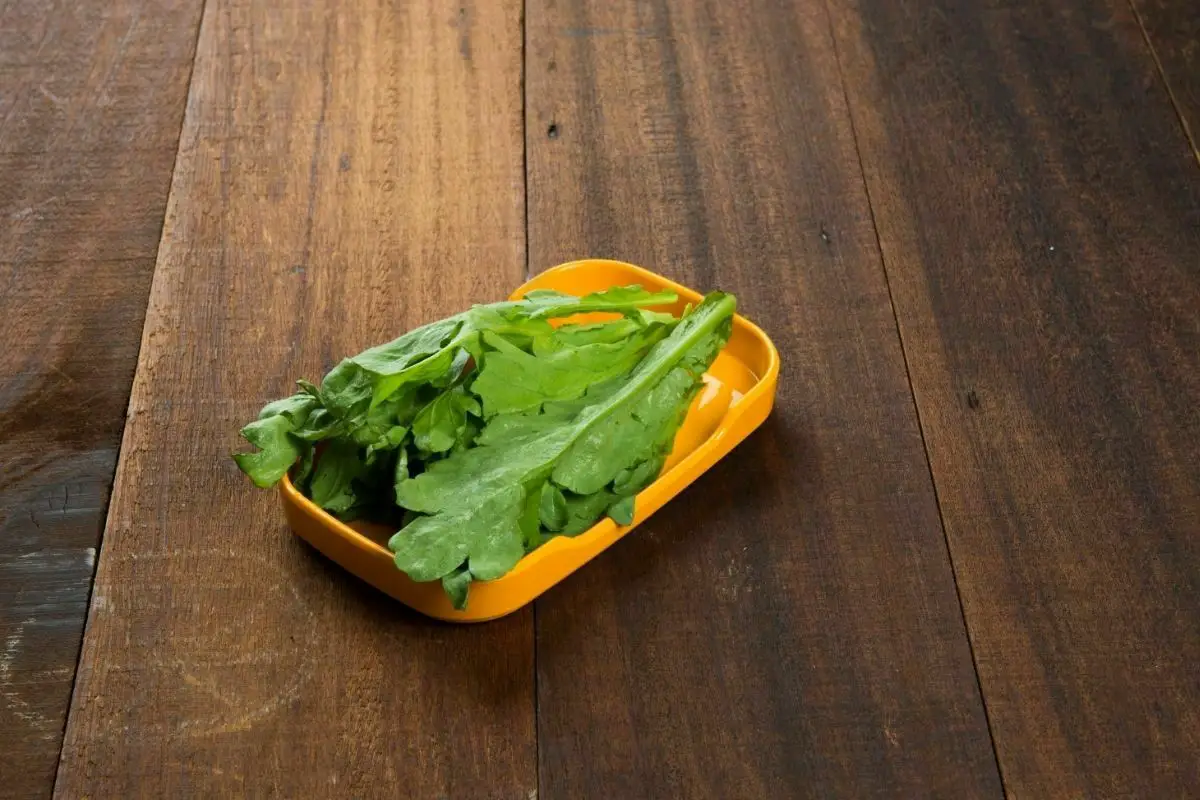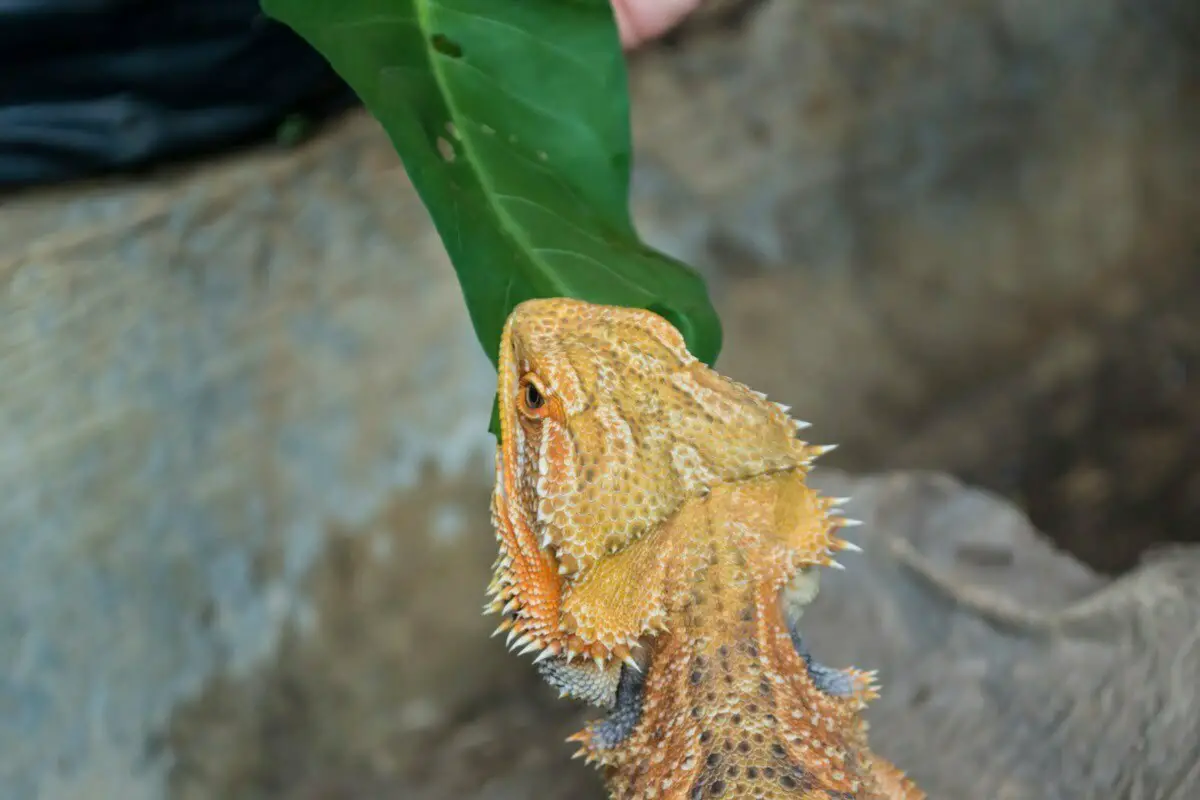Bearded dragons are lizards native to Australia. They are very active animals, and they love to play. Bearded dragons are also known for their intelligence and curiosity. They are often kept as pets because of these characteristics.
Bearded dragons are omnivorous reptiles. This means they eat both plants and meat. In general, they prefer vegetables to meat. However, if you feed them a diet high in protein, they will start eating more meat.

Feeding your bearded dragon the right diet is highly important. It won’t grow properly if you don’t give it enough food. It can also cause other health issues if you don’t feed them properly.
So, to help make sure that feeding your bearded dragon mustard greens is safe, we have put together a guide on everything you need to know about mustard greens.
This includes whether they have any nutritious value for bearded dragons.
What Are Bearded Dragons
Bearded dragons are lizards with long tails and small heads. Their bodies are covered with scales. The color of beards ranges from light brown to black.
Bearded dragons are often kept as pets. They are intelligent creatures who enjoy playing around. They are also great at escaping when placed in an enclosure.
They are omnivores which means they eat both plants and meat. Most people think that they only eat veggies, but this isn’t true.
They also like to eat insects and worms. A lot of people feed live insects such as crickets so the bearded dragon can get its exercise.
The Diet Of Bearded Dragons
Bearded dragons must have a balanced diet to ensure they get enough nutrients from their food. They cannot survive without having access to water either.
If you want to keep your bearded dragon healthy, then you should provide it with a proper diet. It needs to have a good balance of proteins, carbohydrates, fats, vitamins, minerals, and fiber.
You may have heard of different types of vegetables you can feed your bearded dragon, such as mustard greens.
Well, most owners of bearded dragons are often worried about giving their bearded dragons new foods, as certain foods can be harmful to their bearded dragons.
What Are Mustard Greens
Mustard greens are the leaves that grow on the mustard plant. The leaves are usually dark green with veins running through them. These leaves taste peppery. They are often compared to kale and collard greens.
Mustard greens are one of the most popular vegetables for humans. They are used in many dishes, including salads, soups, stews, and stir-fries.
They contain vitamin K, folate, calcium, iron, magnesium, potassium, phosphorus, and zinc.
Can Bearded Dragons Eat Mustard Greens?
The simple answer is yes, bearded dragons can eat mustard greens. In fact, mustard greens are considered to be one of the top leafy vegetables to give your bearded dragon.
Vets also support the fact that giving your bearded dragon mustard greens is good for them.
In fact, most vets argue that you should start adding mustard greens to your bearded dragon’s diet so they can get all the nutrients that can help them thrive.
Although, as with all foods, it is best to have them in moderation. This applies to adding mustard greens to your bearded dragon’s diet.
This is because while there are benefits to adding mustard greens to your bearded dragon’s diet, there are also negatives to it as well.
Is It Safe For Young Bearded Dragons To Eat Mustard Greens?

It is safe for young bearded dragons to eat mustard greens. Although, if you are unsure about how much to add to their diet, it would be better to wait until they reach adulthood before starting them off on this type of diet.
Since mustard greens are high in calcium, they are especially great to give your younger bearded dragons to help with their growth.
The Nutrients In Mustard Greens
In order to see how good mustard greens are for your bearded dragon, we need to look at their nutritional value.
One of the main things that makes mustard greens great for bearded dragons is that they contain loads of vitamins and minerals. Some of these include:
Vitamin A
Mustard greens are rich in vitamin A, which helps keep your skin healthy. They also contain beta-carotene, which converts into vitamin A. They contain 9 percent of your daily value of vitamin A in one cup of mustard greens.
Calcium
Mustard greens are full of calcium which is vital for building strong bones. They contain around 4 to 5 percent of your daily requirement of calcium in one cup.
Bearded dragons need a lot of calcium when they are babies, as this is when they do their most growing.
It also helps to make sure they do not develop any deformities in their feet.
Protein
Mustard greens are also loaded with protein. One cup contains around 2 grams of protein. Protein is good for bearded dragons because it helps build muscle mass.
Vitamin C
Mustard greens are packed with vitamin C. They contain around 44 percent of your daily value in one cup. Bearded dragons need vitamin C to help fight infections.
Vitamin K
Mustard greens are very rich in vitamin K. They contain around 120 percent of your daily value per cup.
More Nutritional Information
In one cup of mustard greens, there are:
- 15 grams of calories
- Less than one gram of fat
- 2 grams of fiber
- 1 gram of sugar
The Benefits Of Mustard Greens
There are many reasons why you should add mustard greens to your bearded dragons’ diet. Not only do they provide your bearded dragon with lots of nutrition, but they also provide some unique benefits too.
Here are just a few of the benefits that adding mustard greens to your beardies’ diet will bring.
Helps Build Strong Bones
One of the biggest benefits of adding mustard greens to your bearded dragon’s diet is that they help build strong bones. This is because they are high in calcium. Calcium is essential for building strong bones.
It is also important for teeth and gums. This is especially important for bearded dragons as they often have issues with their feet.
Improves Digestion
Another benefit of adding mustard greens to a bearded dragon’s diet is that they improve digestion. This is due to their fiber content. Fiber helps move food through your digestive tract more quickly.
As a result, this means that your bearded dragon gets all the nutrients from its food faster.
Keeps Your Skin Healthy
Another benefit of adding mustard greens is that they help keep your skin healthy. This is because they contain vitamin A. Vitamin A is an antioxidant that protects your skin against damage caused by free radicals.
Helps To Fight Off Diseases
Mustard greens are rich in antioxidants. These antioxidants can help fight off diseases and also help you prevent developing certain diseases related to oxidative stress.
Fantastic Source Of Vitamin K
Mustard greens also contain vitamin K. This is fantastic news if you have a bearded dragon who has a vitamin K deficiency due to being on antibiotics for a long time.
Vitamin K helps with blood clotting. If your bearded dragon has been taking antibiotics for a while, it could be at risk of having problems with blood clotting.
Adding mustard greens to his or her diet will ensure that he or she does not suffer any health complications.
The Negatives Of Mustard Greens
While mustard greens are great for your bearded dragon, there are still a few negatives associated with them.
Mustard greens do contain high levels of oxalate. Oxalates are safe for bearded dragons in small doses. However, oxalates are not good for bearded dragons in high doses.
This is because oxalates bind with the calcium in bearded dragons’ bodies. This prevents the calcium from being absorbed into the bearded dragons’ bloodstream.
Over time oxalates can deplete the already existing calcium in your bearded dragon’s body. This can lead to many issues, the main one being metabolic bone disease. So what are the symptoms of a metabolic bone disease?
Well, your bearded dragon may start looking thin and weak. He or she may even lose weight. Their limbs may look deformed or swollen.
In the worst cases, this can lead to your bearded dragon being paralyzed, or they could even die from this.
So with this in mind, we need to know how high the levels of oxalic acid are in mustard greens. In 100 grams of mustard greens, there are 128.7 milligrams of oxalic acid.
This means that feeding your bearded dragon mustard greens every so often will not do any harm.
However, feeding your bearded dragon mustard greens in excess is not a good idea.
To help you better understand how high the oxalates are in mustard greens, spinach has 970 milligrams of oxalic acid in 100 grams of them.
Feeding Your Bearded Dragons Mustard Greens
So now that we are aware of the benefits and negatives of giving your bearded dragon mustard greens, we should look at how often you should feed your bearded dragon mustard greens and how much you should feed them.
Since mustard greens have oxalic acid in them, you need to make sure you are not feeding your bearded dragon too many mustard greens. It is possible to introduce mustard greens into your bearded dragon’s daily diet.
However, if your bearded dragon is already suffering from metabolic bone disease, then you may want to give mustard greens to your bearded dragon once a week.
If you do decide to introduce mustard greens into your pet bearded dragon’s daily diet, then we would recommend not giving your bearded dragon more than 100 grams of them a day.
To get the most out of mustard greens then, it would be a good idea to serve them with other vegetables that are also great for bearded dragons.
How To Give Your Bearded Dragon Mustard Greens
So to help you with giving your bearded dragon some mustard greens, we are going to walk you through how you can serve your bearded dragon mustard greens.
The great thing about mustard greens is that they take no effort at all to prepare. Unlike some vegetables you feed your bearded dragon, you can give them to your bearded dragon as they are in the packet.
If you want to give your bearded dragon the best food, then when you go to purchase some mustard greens, we recommend only going for organic mustard greens.
The reason it is better to go for the organic option is that they do not contain herbicides and pesticides.
Chemicals such as pesticides and herbicides can be harmful to bearded dragons. In fact, they can make your bearded dragon very sick or even cause death.
When you buy your mustard greens, wash them thoroughly before putting them in your bearded dragon’s bowl. If you don’t wash them properly then you run the risk of getting bacteria on your beardies’ skin.
Also, if you do not get organic mustard greens then you should definitely wash them to make sure you get as much of the herbicides and pesticides off of them.
Whilst there is always the option of cooking mustard greens, for your bearded dragon, it is much better if they are served raw. The reason for this is that this way, they hold onto more of their nutritional value.
So to serve them raw, all you have to do is cut the mustard greens up, so they are a suitable size for your bearded dragon to eat. For younger bearded dragons, make sure they are a lot smaller.
Then place them on a plate with a mixture of other vegetables or even fruit.
Other Green Leaves Good For Bearded Dragons

Now that you know what kind of green leaves your bearded dragon likes, you will be able to find any other green leaves that you can add to his diet.
There are plenty of different types of green leaves that your bearded dragon can enjoy eating.
Some of these include kale, spinach, collards, Swiss chard, turnip greens, beet greens, romaine lettuce, arugula, dandelion greens, watercress, parsley, and cilantro.
It is important to check the nutritional value of these before you give them to your bearded dragon.
This is so you won’t accidentally give your bearded dragon a vegetable that contains a high level of oxalic acid, which can cause them harm.
Frequently Asked Questions
Where Can You Buy Mustard Greens?
You can find mustard greens in most supermarkets. They are usually sold in large bags. You could even try going to your local farmer’s market to see if any mustard greens are available.
There may be places you can order mustard greens online if you are struggling to find them in stores.
What Type Of Foods Should I Use To Mix With Mustard Greens?
When mixing your bearded dragon’s food, we recommend using a variety of different types of vegetables.
You should mix mustard greens with collard greens, broccoli, alfalfa hay, turnip greens, kale, parsley, watercress, Swiss chard, cabbage, bell peppers, green beans, and dandelion.
You can also pair mustard greens with cooked sweet potato, cucumber, sprouts, squash, okra, mushrooms, carrots, asparagus, and corn.
Mustard greens also go well with fruits! These are fruits such as apricots, figs (high in calcium), raspberries, dates, and strawberries.
Will My Bearded Dragon Like The Taste Of Mustard Greens?
The taste of mustard greens is mild and slightly bitter. Your bearded dragon will enjoy eating them. Most bearded dragons love the peppery taste of mustard greens.
They will still enjoy them just as much as any other vegetable.
Final Thoughts
If you want to feed your bearded dragon healthy meals then you need to ensure that you are providing them with a wide range of nutritious options. This includes giving them a good selection of vegetables.
We recommend giving your bearded dragon a wide range of different vegetables. When choosing which ones to include, you should choose those that are high in vitamins and minerals.
Mustard greens are an excellent source of vitamins A, C, K, B6, iron, magnesium, calcium, phosphorus, and potassium. It is important that you give your bearded dragon a wide variety of these nutrients.
Doing this ensures that they get enough of each nutrient to live a healthy life.
Mustard greens are perfectly safe to offer to your bearded dragon. However, you should only give them small amounts at first. Make sure you monitor how your bearded dragon is reacting to the new food.
If they seem to be having trouble digesting the food then you could reduce the amount you are feeding them.
We hope that this article has helped you learn about the benefits of serving mustard greens to your bearded dragon. Please share our content with your friends and family or anyone you know who has a bearded dragon.
Thank you for reading!
